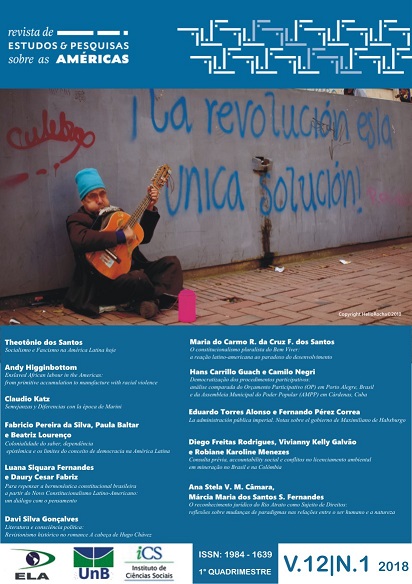O Reconhecimento Jurídico do Rio Atrato como Sujeito de Direitos: reflexões sobre a mudança de paradigma nas relações entre o ser humano e a natureza
Keywords:
DireitoAbstract
O reconhecimento jurídico do rio Atrato, na Colômbia, como sujeito de direitos, é o ponto de partida das reflexões propostas no presente trabalho, as quais conduzem a uma investigação acerca do paradigma antropocêntrico que hegemonicamente norteia a relação entre o ser humano e a natureza, mas que vem sendo desconstruído a partir de uma relevante práxis sul americana, precisamente por meio das contribuições das cosmovisões dos povos ancestrais andinos, como VivirBien/BuenVivir, Pachamama e Sumak Kawsay, e da construção das insurgentes noções de interculturalidade e descolonialidade, que convergem para a construção de um novo paradigma civilizatório. O objetivo do artigo é estudar e analisar a recente decisão da Corte Constitucional Colombiana, quanto ao reconhecimento de subjetividade ativa ao rio Atrato, buscando-se compreender os possíveis impactos que a sentença poderá promover para além do caso concreto que encerra. Utilizando-se da metodologia de estudo de caso, com consulta de bibliografia especializada nacional e estrangeira, de análise de conteúdo dos documentos jurídicos pertinentes, identifica-se um importante precedente judicial no campo do direito interno e na seara do direito internacional, que indica a tendência de superação do paradigma antropocêntrico e impulsiona o reconhecimento da Natureza como sujeito de direitos e de dignidade planetária.
Palavras-chave: Rio Atrato. Mudança de Paradigma. Direitos da Natureza. Bem Viver.
The Legal Recognition of the Atrato River as a Subject of Rights: reflections on the change of paradigm in relations between human beings and nature
Abstract
The legal recognition of the Atrato river in Colombia as a subject of rights is the starting point of the reflections proposed in the present work, which lead to an investigation about the anthropocentric paradigm that hegemonically guides the relationship between the human being and nature, but which has been deconstructed from a relevant South American praxis, precisely through contributions from the worldviews of the Andean ancestral peoples, such as VivirBien / BuenVivir, Pachamama and Sumak Kawsay, and the construction of insurgent notions of interculturality and decoloniality, which converge towards the construction of a new civilizing paradigm. The objective of this article is to study and analyze the recent decision of the Colombian Constitutional Court regarding the recognition of active subjectivity to the Atrato river, seeking to understand the possible impacts that the sentence may promote beyond the concrete case that ends. Using a case study methodology, with consultation of specialized national and foreign bibliography, analysis of content of the relevant legal documents, an important judicial precedent is identified in the field of domestic law and in the area of international law, which indicates the tendency of overcoming the anthropocentric paradigm and impels the recognition of Nature as a subject of rights and planetary dignity.
Keywords: Atrato River. Paradigm change. Nature Rights. Living Well.
El Reconocimiento Jurídico del Río Atracto como Sujeto de Derechos: reflexiones sobre el cambio de paradigma en las relaciones entre el ser humano y la naturaleza
Resumen
El reconocimiento jurídico del río Atracto en Colombia como sujeto de derechos es el punto de partida de las reflexiones propuestas en el presente trabajo, que conduce a una investigación acerca del paradigma antropocéntrico que hegemónicamente orienta la relación entre el ser humano y la Naturaleza, pero que viene siendo desconstruido a partir de una relevante praxis sudamericana, precisamente por medio de las contribuciones de las cosmovisiones de los pueblos ancestrales andinos, como Vivir Bien / Buen Vivir, Pachamama y SumakKawsay, y la construcción de las insurgentes nociones de interculturalidad y descolonialidad, que convergen hasta la construcción de un nuevo paradigma civilizatorio. El objetivo del artículo es estudiar y analizar la reciente decisión de la Corte Constitucional Colombiana en cuanto al reconocimiento de subjetividad activa al río Atrato, buscando comprender los posibles impactos que la sentencia podrá promover más allá del caso concreto que encierra. Utilizando de la metodología de estudio de caso, con consulta de bibliografía especializada nacional y extranjera, de análisis de contenido de los documentos jurídicos pertinentes, se identifica un importante precedente judicial en el ámbito del derecho interno y del derecho internacional, que indica la tendencia de superación del paradigma antropocéntrico e impulsa el reconocimiento de la Naturaleza como sujeto de derechos y de dignidad planetaria.
Palabras clave: Río Atrato. Cambio de Paradigma. Derechos de la Naturaleza. Buen Vivir.
Downloads
Downloads
Published
How to Cite
Issue
Section
License
The published material is the property of the Journal, and may be reproduced in whole or in part with indication of the source.
Copyright: Authors will be responsible for obtaining the copyright of the material used. Authors who publish in this journal agree to the following terms:
a)Authors retain the copyright and grant the journal the right of first publication, with the work simultaneously licensed under
the Creative Commons Attribution License which allows the sharing of work with acknowledgment of authorship and initial publication in this journal.
b) Authors are authorized to take additional contracts separately, for non-exclusive distribution of the version of the work published in this journal (eg, publish in institutional repository or as a book chapter), with acknowledgment of authorship and initial publication in this journal.
c) Authors are allowed and encouraged to publish and distribute their work online (eg in institutional repositories or on their personal page) at any point before or during the editorial process, as this can generate productive changes as well as increase the impact and the citation of the published work (See The Effect of Free Access).
















